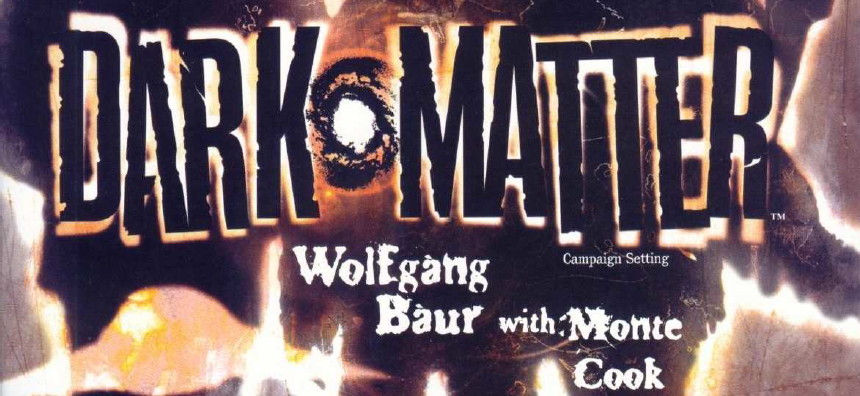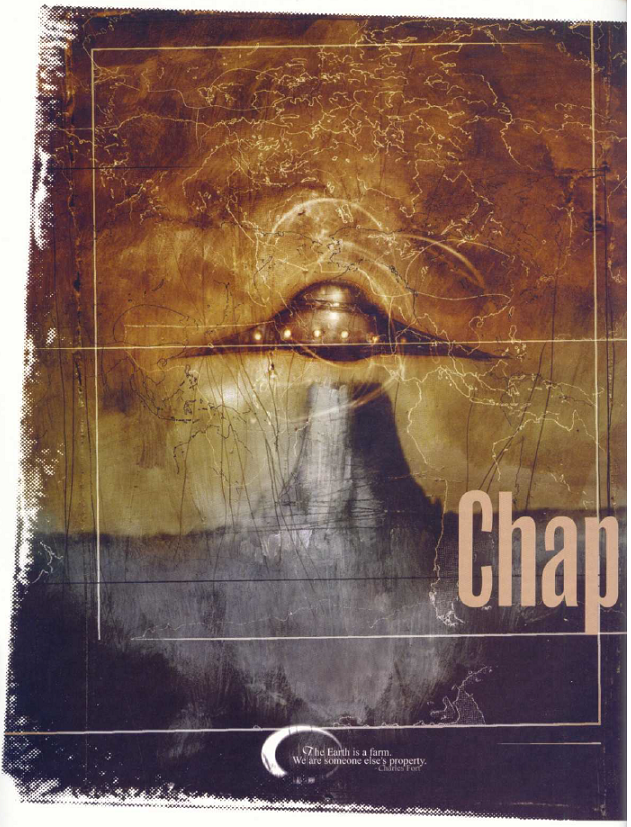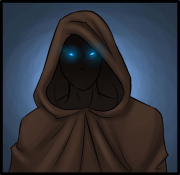|
Fun fact: Sarmatians are people of some questionably historical reality from.. central near Asia that Polish nobility of the Poland-Lithuania era claimed to be descended from.
|
|
|
|

|
| # ? Apr 18, 2024 08:58 |
|
JcDent posted:Don't quote me on this, but when the Conquistadors came to the New World, they had more crossbows than guns. Yep. If you want a modern equivalent, crossbows were standard issue weapons, like an assault rifle, while aquebuses were RPGs or ATGMs, a heavy, low-rate-of-fire specialist weapon used against heavy cavalry.
|
|
|
|
Wrestlepig posted:the game is officially called Runequest: Roleplaying in Glorantha so I'd probably call it that. One side note on this: I really appreciate that this iteration of Runequest didn't do a generic hunter god writeup to cover all hunter cults. You could theoretically have a party that consists of an Odalya Hunter, a Foundchild Hunter, and a Yinkin hunter and they'd all have different niches and different magic.
|
|
|
|
It's a lot more fun to put PCs in the shoes of native inhabitants of not-South America/Africa/Australia faced with strange, alien, brutal invaders with powerful exotic weapons and equipment that you can loot when you kill them and turn against them. Basically, Aztec-COM.
|
|
|
|
7th Sea 2: Actually, I Quite Like It, Honestly The setting chapter opens with something I quite appreciate - a section on diversity. While it seems to believe that 17th century Europe wasn't especially diverse - not true, by the way, diversity has been a constant in most of history - it does note that even more than in real history, Theah has a wide range of ethnic diversity. See, the Vaticine Church has always held that all men and women are born equal, regardless of appearance, and have pushed this concept with rather more force than in Real Europe. As a result, cultural migration happened far more often than in regular Europe, and while there are still national stereotypes for what each nation looks like, people who don't fit them aren't seen as exceptions. While the first thing that will come to mind when you say 'Inish' is a pale, blue-eyed redhead, but no one is going to bat an eye if you're black, with brown eyes and black hair. There isn't racism based on appearance - a fact that is a departure from actual 1600s Europe, as the Transatlantic slave trade was getting started and as a result, modern racism was in its infancy. In Theah, racism is usually based instead on where you're born. If you were born in Inismore, you are a dirty Inishman regardless of skin tone, and every kind of ethnicity can be easily found in any nation, fully accepted as a person from that nation - with all the good and bad that brings. National identity has really started to bloom in modern Theah, only about a century old, and it's begun to spread, y'see. Our first nation writeup is Avalon, aka Not England. Theans tend to use Avalon to refer to the United Kingdom, which is all three of the Glamour Isles, but the name properly refers to only Not England - add in United Kingdom, and it also refers to Inismore and the Highlands. Avalon is a place of faerie glamour and superstition, and with good reason. The isle Avalon itself is a hilly place with many forests and moors, but not much in the way of mountains. They're warm and rainy, and so they have very good cropland. Morning and evening are almost always full of thick fog. Avalon's ruler is Queen Elaine, Keeper of the Sacred Graal, and both Inismore and the Highland Marches have sworn fealty to her. The island is also home to the Sidhe, an ancient race that, long ago, made a great sacrifice to grant the power of Glamour to the people of the isles. Glamour is the power to summon legend, and it is shared by both human and Sidhe, but can only be accessed by those that swear a sacred vow to protect Avalon from its enemies, within and without. (Which is new; before, Glamour was still Sidhe-granted but not explicitly tied to any particular thing. You just had it or didn't.) While the three kingdoms are technically united, there's tensions. Avalon's royals have historically exploited the other two, subjugating their people. However, Elaine emerged from the civil wars of Avalon, bearing the Graal without explanation. Some still doubt its origins, her right to rule and her worthiness of the crown. Inismore's king, Jack O'Bannon, might be an immortal demigod, or possibly just insane, but either way he's sworn to serve Elaine so long as she remains true to the isles. James MacDuff, King of the Higlands, has also sworn fealty, but many wonder why, and if it is his own desire or if he actually believes it's for the good of the Highlanders. Avalon, more than any other nation, has nobles close to the common folk. Elaine regularly travels the land, and it is said that her touch can cure any ill. The Avalon people adore her, and indeed can be expected to loyally serve any noble that is good and honorable. A cruel noble, on the other hand, will be hated just as deeply and have to deal with constantly rebellious peasantry. Like most of Theah, society is largely divided between peasant, clergy and noble - but Avalon's added two classes to that list recently, the merchant and the sailor. The merchant guilds of Avalon have grown very wealthy in the last 200 years or so, and they've struck deals with nobles that have a lot of land but not a lot of money. The nobles sold their lands and titles for cash, and that's made merchants a growing and potent middle class. Sailors are even more recent, as Elaine needed a navy even if it broke protocol, and so she announced that anyone sailing under Avalon's banner was a "noble sailor" - equivalent to a knight in rank, and with the right to a percentage of any plunder seized while under the flag, no matter how it was taken. Thus, Avalon's navy has swollen massively. The shift to make the mercantile class a major thing is new, but the sailor thing isn't, except in the sense that it's being more formally called out. Overall, the entire feel of Avalon as a place of fairy tales and Elaine's court as a mirror of Arthur's are kept, though the specific Arthurian stuff is not being played up in this book. We also note that the native tongue of Avalon was Cymru - Not Welsh - but that almost no one spoke it for years due to the Montaigne occupation. Cymru is regaining popularity, and people with more Not French names (David, William) are changing them back to Cymru equivalents (Dyffd, Gwillim), with more and more kids being named after Avalon cultural heroes of the past. Oh, and Avalon sailors have invented pockets, which are becoming quite popular, as is long hair and, for men, trimmed facial hair. Wigs and makeup are seen as effete. Married women hide their hair under a hat, and maidens wear it braided. As in 1st ed, Avalon manages its own currency, the pound sterling (and its subdivider, the shilling). These are coins, though bank notes are growing in use for large amounts. Elaine has also allowed use of the Vesten Guilder (despite her advisors' objections) in order to maintain good relations with the neighboring islands, and the Guilder is now nearly as commonly used as the pound. Avalons tend to be extremely hospitable and extremely superstitious, not least because of the Sidhe. When you have literal terrifying faeries wandering around, science has trouble making inroads, and when a Sidhe lord might wander by in disguise for no real reason, you tend to be nice to strangers. The old faith of Avalon was suppressed by the Vaticines, but it has survived, in a sense, in the form of ballads and folk tales, which are enormously popular. No one worships the old gods any more, but their names live on as heroes and kings and monsters, and the old rites live on as folk dances - less meaningful but still present. The songs tend to be fairly formulaic, such that anyone who knows Avalon story patterns can usually join the chorus even if they've never heard the song before, and they're all basically dancing or drinking tunes. The tales tend be rather bawdy, with lots of sex and lots of being a fuckup. The stories are, on the surface, morality plays - but it's always with a sort of undercurrent of comedy and mockery of the morals that the songs openly preach, which makes Avalon folk music pretty unique. The Old Ways are returning under Elaine's rule - a definite shift from 2nd Ed, where Elaine was instead presiding over what was effectively Not Anglicanism. Instead, Elaine is happy to try and bring back the old faith and invite the Sidhe more fully into their lives. Her religious reforms are controversial, though, with the Traditionalists wanting to more fully purge the Vaticine Church from the island, and the Vaticines seeking to remove the influence of the resurgent Old Ways. Many Vaticines have left Avalon entirely, but not all. The Church still runs a number ouf universities, as Elaine offered the scholars her protection against the Inquisition...and as a result, quite a few of them have converted to the Church of Avalon over the Vaticine. Elaine is practically an absolute monarch. She has a Parliament, but they can gather only with her permission, and they represent the various parts of the island. She can't go to war without their permission, and requires their permission to pass certain laws. When she wants it, she summons them, presents her case and has them vote. While these formal gatherings only happen on her say-so, the members often gather informally. As long as they don't gather in enough numbers to make a vote, Elaine allows use of this loophole and officially ignores it. She knows the nobles of Avalon are powerful and doesn't want to anger them. Similarly, Parliament has, overall, enough respect for her and the Graal to maintain official respect for the rules. Elaine has spent much oif her time rebuilding the Avalon military, which had been utterly exhausted by its civil wars. However, rather than use conscription, her focus was on building a navy by offering her court the chance to profit off it. It worked amazingly, and the navy was built in record time. After that, she sent out messages to Eisen warlords and Numan warriors, and while most were too proud to head out and teach her soldiers, several did leave their homes to join Avalon. (Numa, for the record, is a mix of Not Rome and Not Greece in this edition, with Vodacce having absorbed some of it and the rest being Not Greece.) The Numans, who tend to be darker skinned, brought a lot of new ideas to Avalon, which adapted to them well after a few rough years. The Eisen and Numa soldiers were also called on to help dismantle all standing armies on the island, removing the ability for a military coup. Only Elaine is permitted an army now, with nobles only allowed garrisons of 10-20 soldiers for home protection. The nobles are not happy with this, but accepted it when Elaine told them that Avalon couldn't afford both a huge army and a huge navy, as they like having money. Queen Elaine on Other Nations posted:Castille: Thank Theus the Vaticine Church is still recovering from the Montaigne invasion, otherwise they would be seeking our heart on a silver platter. We know they plot against us, but are unable to enact their machinations. Let them continue their plotting. The more they split their attentions, the less they focus on us. Overall, Avalon is pretty similar to its 1st Edition incarnation thus far. Elaine's absolute power and general distaste for giving up much of it paints her in a somewhat less flattering light, but she's still intended as a very sympathetic figure, and the main shift has been to make a re-embracing of the Not Welsh heritage of Avalon a thing, rather than just going full on Arthur But With Anglicanism. Next time: Castille. Mors Rattus fucked around with this message at 15:41 on Jun 19, 2018 |
|
|
|
It's basically the evil governor from Pocahontas these days instead of locusts.
|
|
|
|
Warhammer Fantasy Roleplay: Realms of Sorcery His Imperial Majesty's Secret Service The Grey Wind of Ulgu represents the feelings of confusion and disorientation. It is drawn to the occult, the obfuscated, and the hidden, and the Magisters drawn to the Wind of Ulgu love secrets and knowledge. Though they call their magic 'Cryptoclastic Thaumaturgy' they are the Empire's masters of illusions and tricks. While Shadowmancers are sent to the battlefield to conceal the movement of troops and confound enemy scouts, their real role is as a branch of the Empire's intelligence services, reporting directly to their Order rather than to the Emperor or the nobles that they advise. The Shadowmancers consider themselves above individual political appointees and work among the cities and provinces of the Empire, maintaining webs of informants and secret messages that they use to expose the hidden dealings of others. While the White Order prosecutes overt dark magic and assails cases of demonic possession, the Shadowmancers of the Grey Order arrange accidents, unveil secrets, and expose threats to what they see as acceptable Imperial order from both mundane and Chaos threats. As you might imagine, there are problems with a self-appointed order of illusionist intelligence operatives who specifically do everything they can to operate without any legal oversight. Shadowmancers are fairly rare, like all Magisters, but they risk stepping on the toes of 'legitimate' law enforcement like the Witch Hunters, especially as they usually don't tell anyone else what they're up to. Their ability to cloak their activities with magic, to operate as if they were someone else entirely, and to conjure forth illusion and deception makes identifying them and organizing them very difficult. This independence, dangerous as it is, started from a reasonable root: When Volans was organizing the Colleges under Teclis the Empire had just come off of centuries of civil war. Shadow magic would be especially useful to the maneuverings of the Elector Counts, and as is always the case with spies and assassins, the powers that be worried that the Grey Order could end up a destabilizing influence in the struggles of Imperial politics. There was also worry that an individual corrupt Emperor could use sole control of a powerful intelligence agency to secure their rule against any comers, or cloak terrible activities. So they were told not to seek direct contracts and binding vows with any of the Empire's political bodies, and to simply take it as their mandate that they use their abilities to oppose Chaos and support the 'institutions' of the Empire. The Grey Order being an entirely self-policing intelligence service with no effective oversight and a broad mandate was an inevitable result of refusing to bind it directly to any Imperial institution. The Empire hasn't paid for this yet, but it's hard to believe that will continue forever. The Order attempts to control its agents by making them take strict vows of poverty and swear oaths to only use their powers for the 'good of the Empire', but given it's an entire Order of master illusionists, tricksters, and liars I can't imagine any of that is easy to enforce. Not only that, but what happens when an agent has a very different view of 'the good of the Empire' than their Order would conventionally sanction? The book mentions that the Grey Order has had to sanction, Pacify, or otherwise deal with more of its members than any other Order as a result of having to be on guard against rogue agents at all hours, but that just sounds like a sign of a persistent problem rather than coming off as effective policing like the writer intends. If you're constantly having to prosecute people who break your strictures, your strictures are not doing a good job of preventing issues in the first place. Curiously, one of the great symbols of the Grey Order is the sword, and members are expected to become competent with a blade (there is no mechanical distinction for this; Grey wizards don't get any special skills with swordfighting and would have to multiclass to be a competent hand to hand fighter, same as any other wizard). Almost all Shadowmancers carry a sword somewhere on their person, though they may keep it hidden with either magic or their favored concealing robes. When Teclis was first choosing students for the Grey Order, he selected for honest and honorable individuals. Most Shadowmancers think of themselves as very loyal people, loyal to their Empire and the struggle against Chaos; what does it matter if they lie or deceive so long as they are lying and deceiving in the name of the Empire? They tend to be pragmatic individuals who like to see situations resolved with a minimum of bloodshed and force. To that end, assassinating a rebel noble before they manage to raise an army or tricking someone into revealing their crimes before their peers is preferable to dramatic arrests or epic battles. Shadowmancers believe that study of magic, politics, and history are all important, but that all such knowledge needs to be applicable to fieldcraft. Everything you learn should be used in the field, otherwise what was the point of learning it? They believe they are quietly shaping a better world with every garroted crime lord, every 'accident', and every scandal. The College of Shadow almost never takes applicants who come to them; they believe that a proper Shadowmancer should have the practice thrust onto them out of nowhere, and that a student who actively wanted to use the power of Ulgu before being trained will be prone to misusing it or becoming a rogue agent. They also prefer to take their students very young, so that they won't have had too much experience with the 'real' before being exposed to a world of illusion; a less charitable interpretation would be that they prefer having students they can more easily indoctrinate into their Order's ideas about state security. Magisters of the Grey Wind tend to travel much more than other Colleges, and they take their Apprentices with them on their adventures. Rather than spending all their time in a College building, Shadow Apprentices are usually out serving as lookouts and sidekicks while their master pushes someone off a balcony. The College itself is actually exactly where you'd expect it to be: Hidden in plain sight in the worst part of Altdorf as a bunch of 'abandoned' buildings that are all bigger on the inside than they seem to be on the outside. Inside, the Magisters keep their records of all of the secrets they have uncovered, a veritable treasure-trove of blackmail material accumulated by the Empire's magic spies. Like Jade wizards, there are only a few desk-jockeys within the crumbling, decrepit buildings of the College of Shadow at any specific time. Reiner Starker is the current Patriarch of the Order and he is a fanatic. Not just a fanatic believer in his Order and their duties, but a fanatical follower of Sigmar. Everything about him is about as you'd expect; skilled infiltrator, decent teacher, terrifying assassin, except for his strong faith in Sigmar himself, and his desire to inspire that faith in others. This is very unusual in a wizard, as they usually don't get that devout. Such is Reiner's faith that he is often mistaken for one of the Witch Hunters when he wanders abroad, and he will take any steps he feels he must to stiffen the belief of improperly pious villages and noble households in his path. Next Time: Heads in the Clouds.
|
|
|
|
Rand Brittain posted:It's basically the evil governor from Pocahontas these days instead of locusts. next: does the geography of the world actually support the notion that a bunch of seafaring nations would want/need to be sending ships around and pirating on each other? i recall the original edition's geography made it seem extremely unlikely that there'd be any reason for the nations to have huge sea navies and the only feasible pirating was up and down the rivers that cross the landmass
|
|
|
|
Freaking Crumbum posted:next: does the geography of the world actually support the notion that a bunch of seafaring nations would want/need to be sending ships around and pirating on each other? i recall the original edition's geography made it seem extremely unlikely that there'd be any reason for the nations to have huge sea navies and the only feasible pirating was up and down the rivers that cross the landmass Multiple continents, sea colonies and nearby islands now. Also, overland trade is harder due to distance and Eisen being a shithole.
|
|
|
|
Sea trade was always huge. It's way, way easier to move tonnage of freight over water than over land.
|
|
|
|
Mors Rattus posted:Multiple continents, sea colonies and nearby islands now. Also, overland trade is harder due to distance and Eisen being a shithole. 2 for 3! did wick abandon the system where XP are also drama dice that are also action points and then publish adventures that are deadly enough that players need to spend XP to survive a flubbed roll but also don't reward enough XP at the end to make playing the adventure a net XP gain? do the combat mechanics make specialty skills / schools worth buying or is it still overwhelmingly better to just stack a main combat attribute and roll from there?
|
|
|
|
How and when did Wick pull his head out of his rear end? This fills me with hope for the human race.
|
|
|
|
^^^ He's still kinda Wick and it shows in a few places but he has learned to separate his ranting from his game production, and in fact is not directly involved in the writing of most of the line. Freaking Crumbum posted:2 for 3! Drama Dice are no longer XP; advancement in stats is now directly tied to story progression. Duelists are now so overwhelmingly better than normal hit-a-guy combat that they had to patch the game in the first supplement to add a merit that lets non-Duelists be relevant in combat.
|
|
|
|
Mors Rattus posted:In the late 1990s and early 2000s, a game called 7th Sea was produced. I wrote it up for the first iteration of this thread, in 2011. Ahh, been looking forward to this!
|
|
|
|
It's more than that; Dueling is basically the only part of the rules that's honestly complex enough to be called a "system." 7th Sea 2e and Onyx Path's new Storypath are, at heart, very similar mechanically, except that 7th Sea is way, way simpler.
|
|
|
|
7th Sea 2: I Did Prefer El Vago Tho Castille is one of the oldest nations in Theah. It has been an ally to the Crescents, an enemy to Avalon and Montaigne, and, most recently, home of the heart of the Vaticine. Despite its hundreds of years of war and invasion, its heart has remained largely unchanged, passionate and strong. Around four years ago, it was invaded by Montaigne and caught entirely off guard. The invasion was repelled, but at great cost. Farmland was ruined, half a generation slain or crippled. Castille is weak now, almost fallen. Its land remains valuable - it's sitting on top of rich mineral deposits, great farmland and fish-heavy ocean, and until recently, its people never knew want. It has warm winters and long summers, and the knowledge and science brought by the Church had turned it into an economic powerhouse - until the invasion. The nation is ruled over by the Sandoval family, and its land is largely divided into counties run by the Grandes de Castille, as the noble upper class is known. Each Grande rules a land grant, called a concesion, where they are empowered to collect tax and administer justice, and must house part of the king's army. The last king died recently, leaving his throne to his twelve-year-old son. The boy is known as "Good King Sandoval" due to a line by a famous court poet, and the fact that he's held the nation together for four years is honestly more than anyone ever expected from him. This is all pretty much identical to 1e. While the king is the nominal ruler, it's no secret that he is heavily influenced by his Church advisors. There have so far been three attempted assassinations, but each was foiled, often due to the efforts of the mysterious vigilante El Vagabundo. (I miss El Vago, but I assume the name change was for cromulent Spanish.) So far, El Vagabundo has proven more than a match for plotters against King Sandoval, but that could change. See, the constant presence of Church advisors has kept Sandoval from talking much with the Grandes directly, and the bureaucracy is breaking down. Corruption and graft are rampant, and the economic losses to it are causing basic systems to fail, with the king apparently powerless to prevent any of it. Still, Castille has always been a practical nation, and they are some of the most advanced on the entire continent. They are the only Thean nation to have aqueducts in all their cities, as well as free public education for all, and their crops remain vibrant. Even the smallest village has a church stocked with medical supplies, a small library and a trained scientist or doctor to help run it. Castillians are, on average, the best educated people in all of Theah. (Note: Theah is Not Europe, the continent, as opposed to actual planet.) Castillians also tend to be passionate people who love food, music and dance. They have a nearly religious veneration for motherhood, and mothers are the core of the Castillian family. Their dances are passionate and, some say, lascivious, their music fast. The Church's influence has also made their music extremely precise, as best encapsulated in the guitar. Again, most of these is as per 1e, albeit more explicit in the idea that the Church has made Castille one of the most advanced places around. (Well, and probably their history with the Crescents, who are also quite advanced.) The War of the Cross left Castille weak, allowing the Montaigne invasion to surprise them and destroy so much of their infrastructure. The economy is crumbling and the nobles have often become dispossessed. The other nations are now watching and waiting for a chance to strike, to take the wealth and resources of Castille that they've always envied. Good King Sandoval is doing his best, but it's only a matter of time now. Within Castille, the King and the Church are considered to be equal - though some nobles refuse to acknowledge a boy king these days. Under them are the landed Grandes, followed by the landless ones. Grandes are divided into three classes. The highest are those who have a direct familial tie to the King. Below them are those with land and title. The lowest tier are the hidalgos, those with title but no land. There's a lot of hidalgos these days due to the War of the Cross, twenty years back, which they still haven't recovered from, and the Montaigne surprise invasion. Much of the lost land has been taken by the Church. As a result, most Castillians do not consider any social status below the highest rank to be of much note. It's hard to have noble mystique when your nobles are selling their swords for food money. Before the wars and the corruption set in, life for a Castillian peasant was quite pleasant. They had schools, hospitals and other government services provided to them essentially for free. That is no longer the case in most places. They do still center their lives around family, however. Castillians have no concept of "extended" family. Family is family. Cousin, uncle, second cousin three times removed - they're all family. Families usually trace their bloodline back to a single founder, almost always a woman, and keep the founding matriarch's picture in their homes. Often, they also wear necklaces bearing her image, if they can afford to. As long as the matriarch's blood is shared, that's family, and no matter what sins your family commits, they are family. Only the worst can get you cast out - murder of a family member, say. There is no family justice higher than ostracism. Castillians favor dark clothing as a base, but with highlights in the colors of fire - red, yellow, orange. Style and pattern vary by location, and most Castillians are extremely proud of their local fashion, with even the poor stitching dyed cloth to their outfits when they can. It's not about status or flair - it's about being Castillian. Traditional men's garb is the sombrero, a short vest, tight pants and a cummerbund, and often leggings, adding gloves, cuffs and collars for social events. Unmarried women are easy to spot - they wear white or cream and colorful kerchiefs. Women's designs often grow more brilliant and multicolored as they age and settle down, and married women tend to wear reds, blues and dark greens, accented with black. Beaded skirts are popular, too, as are elaborately tied braids. Until the invasion, Castillian nobles and peasants lived very differently. Peasants tended to be very outgoing and cheerful, and would usually work only four to five hours at a time, with long breaks between shifts for siesta - rest and sport. Other Theans called this sloth, but that's hard to credit, given that many siestas were full of street dances, horse parades, musical performance and contests of skill and daring. The nobles were, in theory, above such activities. They tended to be extremely regimented in etiquette and very proper, with excellent education and a taste for fine arts and music, avoiding peasant celebrations. These days, however, the sheer number of displaced Grandes have been forced to adapt, and many find the exuberance of the lower classes appealing. There has been more class mixing now than ever before. The Church has remained silent on this, largely because they're unsure if it's good, bad or other. They instinctually feel it's wrong, but it seems to be keeping spirits high post-invasion, which is practically a blessing. Ever since the Vaticine Church moved its main seat to Castille 400 years ago, the nation has been the most pious in Theah. It has given Castille a lot of influence politically - there are Castillian diplomats pretty much everywhere in the world - but also a lot of responsibility for living up to the image of the Prophets. It's not been easy, especially with the Church's shift on topics like mercy and forgiveness after the Third Prophet - which have reached a head in the past ten years, as the Inquisition has hit a fever pitch and High Inquisitor Verdugo took power. Castille's government is fractured at best and very chaotic. The death of King Salvador Aldana left the throne in the hands of a child, now only sixteen. He hasn't even been granted the title of Rex Castilium by El Concilio de la Razon, his advisors - the first time that's happened since the 1380s when the royal family was slain by plague. The Cardinals watch his decrees and reworded them, and he's had a constitutional monarchy forced on him that has allowed the Church to essentially take over the country. It doesn't help that the Castillian bureaucracy was a complex and mired process in the best of times. The army has a lack of solid leadership in one sense - the king is providing no clear orders - and too many leaders in another, as the commanders all vie for ideas with no one to decide between them. The war against Montaigne was won only because the Emperor has a short attention span and Castille got lucky. There are far too many 'leaders' in Castille now, and the corruption runs deep. The King is sequestered away in Vaticine City, and while the economy should be booming thanks to the massive resources of the nation and the Church's methodical administrators, the corruption among the tax collectors keeps the wealth flowing into private pockets. The tax collectors, you see, are operating on their own. Called recaudadores, they collect a minimum tax from all Grandes and then report it to the King or Church if this is not provided in some form - wealth, land, a royal marriage. If this fails, they are allowed to bring in the army to help seize the tax. It doesn't help that a third of the nation's farmland is ruined thanks to the Montaigne. The Church's planning prevented a crisis, but the sheer number of disenfranchised Grandes and worthless holdings was beyond even their planning. Reparations are desired, but unlikely to appear. Castille's army is in no better shape. Their numbers surged during the war, but the fighting was intense. They now struggle to hold their land along the borders with sufficient men, and most of the Castillian Armada has been lost entirely. While the Castillians famously fight with all their hearts, they are slowly losing hope. They do, at least, have powerful military technology. Their fortresses, protected by wheeled cannon and tracked cannon rings allowing for quick repositioning of guns, stood well against the Montaigne and are much faster than most artillery. They also have been at the forefront of chemistry, allowing their gunpowder to pack more punch into fewer grains, and they also invented the packed powder charge, so they have no need for powder horns and can load and fire far faster than most other armies. They're now experimenting with measured charges for artillery. Current Relations posted:Avalon: Due to the "heathen" activities of the present Queen of Avalon, Elaine, there is a great deal of animosity between Castille and the island kingdom. But even the spiteful Concilio de la Razon is not willing to act against her at this time, content instead to support her enemies and wait for her to fall from grace. Castille is likewise fairly similar to 1e. The Inquisition has gotten relatively little press so far in the book, but we still have the boy-king and the failing rule. We're more strongly linking that to corruption caused by like of oversight on the nobility, though, and there's a stronger focus on Castille as one of the most advanced civilizations in Not Europe. The war with Montaigne is more definitively over, though, with a Castillian (Pyrrhic) victory. Next time: Eisen.
|
|
|
|
I think it helps that Wick has brought in a wide, diverse, and young team to help on this edition. I know some of the writers and they’re good folks.
|
|
|
|
|
Mors Rattus posted:Duelists are now so overwhelmingly better than normal hit-a-guy combat that they had to patch the game in the first supplement to add a merit that lets non-Duelists be relevant in combat. Good heavens. I have memories of trying to intricately build a Donovan duelist who would then watch the guy who "just" put points in combat skills wreck everything while I flailed.
|
|
|
|
Dawgstar posted:Good heavens. I have memories of trying to intricately build a Donovan duelist who would then watch the guy who "just" put points in combat skills wreck everything while I flailed. I'm sure Mors will get into it, but you have to be a Swordsman to have any options other than rolling your fighting skill.
|
|
|
|
8one6 posted:Murlynd (the one who invented Murlynd's Spoon). He was one of the first PCs for Gary's home game. For as much poo poo people attribute to "St. Gary" he pretty much let people do what they wanted in the games he ran. Played by the late Don Kaye, IIRC; Kaye was a Western buff and wanted to play a cowboy. Also, in regards to the talk about games that spend too much time on setting details -- that's the reason I haven't been able to get into Unity even though I backed the KS. It's a 371-page book that devotes the first 135 pages to setting description and short stories before it finally gets around to character creation. And it isn't even all that unusual or innovative as fantasy settings go!
|
|
|
|
Selachian posted:Played by the late Don Kaye, IIRC; Kaye was a Western buff and wanted to play a cowboy. it's the things left unexplained that tend to create the most mystery and allow for the most innovation from players and GMs. when a book spends 135 pages clearly drawing the borders of the map and filling in every little detail down to the number of blades of grass in the king's backyard, the setting is basically telling you that it doesn't really care about being innovative or unusual. you'll play the incredibly specific game that's being laid out for you or you'll play nothing at all!
|
|
|
|
Warhammer Fantasy Roleplay: Realms of Sorcery Collapse the waveform? The Blue Wind of Azyr is the power of longing, inspiration, and imagination. It is the desire to touch that which is beyond, to see certainty in the uncertain, and to discover things one would have to imagine before they could even know they didn't know them. The Wind refuses to stay chained to the ground, and disperses into the upper atmosphere and the heavens, meaning that the wizards of Azyr spend long hours studying the stars to determine the eddies and flows of their Wind of Magic. Magisters of Azyr are known as Celestial Wizards or Astromancers for their ability to read the future in the stars. They are also called on to control and regulate the weather and avert natural disaster. The single most famous and important aspect of the Blue Wind is its ability to tell the future. Everyone thinks they want to know what will happen before it happens, but the Wind is capricious and chooses what to show the wizard when they look into the stars. To aid in their studies, the Blue wizards have developed (sometimes with the aid of dwarven engineers) all manner of devices for measuring the movements of the heavens. Their magic is partly a mystical process of studying the heavens, yes, but the heavens move according to mathematics and astronomy. Thus, Blue wizards have developed the science of statistical analysis and probability; never gamble with a Blue wizard. They're as likely to beat you by counting cards as to have used any of their magical tricks. According to the principle that one shouldn't use magic where science will suffice, they are also experts at mundane meteorology and predicting the weather. They often share their latest mathematical theories and findings with their colleagues in the Gold College, often while asking them to help build this new telescope or that new astrolab, and the two Colleges are very close. One of the reasons they prefer to use non-magical prognostication and statistical analysis where possible is that what magic will show an Astromancer is uncertain. It will show the future. It will show a very likely (maybe even certain) future. But when a wealthy noble of the Empire asks to have his fortune read to see if he should go ahead with a business dealing, the Astromancer may see something very unfortunate instead, like the exact moment and means of his death. Moreover, the Order is devoted to seeking truth, and they are sworn to accurately and completely report what they see. So if the above Astromancer saw what they saw, they would be obligated by their vows to the Order to tell the unfortunate man. In cases with such precise visions, they very commonly come true exactly as predicted, often after the subject tries to avoid them. To this end, Astromancers fear to observe the future of an individual so directly. Astromancers also have another power that terrifies people: They seem to be able to manipulate Fate. Literally, in game terms; if you'll remember their capstone spell burns a target's Fate Point and/or makes sure the next critical they'll take (if they have no Fate) will be +10 and thus automatically lethal. They can bring lesser misfortunes as well, but they only ever seem to be able to manipulate Fate towards misfortune. The Astromancers themselves wonder about the implications of this sort of magic; if destiny was immutable, how could they possibly cut short someone's good fortune or call disaster down on their heads? What does this mean for the accuracy of their predictions and prognostications? In addition to all the future magic they can just throw a lightning bolt at you or change the weather or call upon the power of wind and flight, which is pretty cool. It doesn't have COSMIC IMPLICATIONS, but who doesn't want to fly around hurling lightning bolts at the forces of evil? Changing the weather also helps them keep the Empire's agriculture working, in concert with the Jade Order. Astromancers love to give the impression that they know everything that will happen before it happens. They don't, but they cultivate the ability to nod sagely and pretend not to be surprised, whatever happens. They tend to be slightly absent-minded and dreamy scholars, always imagining new things and working on some new theorem in the back of their heads. They also practice looking contemplative and tend to stare up at the heavens without realizing they're doing so, sometimes in the middle of a conversation. An Apprentice coming to the Blue College of their own volition will be accepted, regardless of how they do on the dozens of entrance exams. These examinations are merely a form of calibration, studying the statistics of student aptitude so that the student can be started at the right point in their education and matched to the right teacher. The Blue College has a reputation of foresight to uphold, after all, and that starts with seeming to know exactly what a student needed. The few who are turned away are usually sent to the College of Light, with a letter of introduction and a polite explanation that they'd mixed up what kind of wise scholar they wished to become and that the matter is now sorted. Apprentices are then assigned to a teacher and expected to stay within the College, assisting their teacher and learning as much math and astronomy as they can handle. Blue wizards value punctuality and diligence in a student. The Celestial College is in central Altdorf, near the Imperial Palace, but few locals bother to look up and notice the grand observatory above their heads. The spells of fate hide the College from the common person, and are designed to ensure only someone who has guidance or who can see the strands of fate and magic will find the school. The College is actually a massive building of sixteen enormous towers, built of blue and white stone and topped with grand glass domes to allow the inhabitants to study the heavens. The huge towers are the result of an early period in the College's history when the Masters of the College competed with one another to build more and grander observational towers, in honor of the first Patriarch. This is also why all sixteen towers are different heights. Once sixteen towers had been built and the structure started to creak, the Patriarch declared that that was enough towers, and so the College has looked as it does ever since. Unlike some of the others, the Celestial College is a busy place full of students, professors, libraries, and classrooms. This academy is the heart of Celestial Magic in the Empire, and many tenured professors and Magisters never leave it once they attain enough status to focus on their teaching and research. The College is busiest in the evening, with most Magisters staying up late to stargaze and sleeping well into the day. Anyone trying to sneak about the College will find it impossible; the servants of the College are attuned to the Blue Wind and know precisely where and when everyone inside will be where they are. The current Magister Patriarch is actually interesting. Raphael Julevno is the son of an actress and a traveling mercenary (he never met his father) who grew up in Nuln. He began to see visions at the age of twelve, and at fifteen, he saw a future where he ended up in a workhouse, and then a madhouse, because his mother felt the boy had caused more than enough trouble for her and intended to sell him off as a 'lunatic'. Being able to see it coming, he ran away from home and saw a new future in a college of gleaming, impossible towers, a vision that guided him to Altdorf. In Altdorf, he found the building, was told he had been expected, and entered the Blue Order. He proceeded to excel at his studies, earning his Magisterial title by 29 (being the first Celestial Wizard to beat his 30s in ending his Journeyman period) and settling in to a long academic career. At 50, he saw his first vision of Archaon marching south. A year later, he saw his friend, the Patriarch Stern Glanzand, dying in battle against the hordes of the North. When he tried to warn him, the Patriarch told him he had already seen it himself, and that he had further seen that Raphael would be the next Patriarch. Nothing could dissuade the old man facing his fate, and soon enough Raphael was elected Patriarch, despite having told no-one of the old master's vision. They had all seen that he was to become their next leader. He has recently begun to wonder, though; was he elected Patriarch because it was his fate, or was he elected because the various wizards had observed that he would be elected and acted on it? Did Master Glanzand march to his death solely because he had seen it, and thus believed he could no longer avoid it? Was the observation of these possibilities making them more likely? Would they have occurred if these futures had not been seen and acted upon (or not acted upon) by the Magisters? What comes first? The vision, or the likely outcome? The role of perception in making a foreseen future has been keeping the Patriarch up at night. If Fate is some sort of agency that works on being observed and acted upon, what is guiding Fate? Next Time: Death is Certain!
|
|
|
|
Halloween Jack posted:I would really like to know if any other RPG has managed to produce a core boxed set that somehow didn't include character creation or a monster manual. That's a special and, AFAIK, unique sort of gently caress-up. I've been told the first printing of 2300AD lacked character generation rules. It wasn't until the third printing that there were character progression rules.
|
|
|
|
JcDent posted:Fun fact: Sarmatians are people of some questionably historical reality from.. central near Asia that Polish nobility of the Poland-Lithuania era claimed to be descended from. Well, the existence of the Sarmatians is about as well proven as the existence of any non-literate people can be, it's just the connections to Poland that were imagined by romantic Polish aristocrats. But it's that's exactly what makes it a good name for fantasy Europe! Edit: the Sarmatians are even politically relevant today - the reason Russia invaded Georgia a bit ago (besides Abkhazia) was to "reunite" North and South Ossetia, the Ossetians being descendants of the Alans, who were the last surviving subgroup of the Sarmatians. Vestermennervannereherererjar though, ugh. Hopefully the insipid viking influences have been excised, they were always the most out-of-place part of the setting (yes, even more than the space aliens). You can do enough with the Dutch Golden Age without tying it to the bad idea of foisting vikings on your pirate game. PoontifexMacksimus fucked around with this message at 22:20 on Jun 19, 2018 |
|
|
|
Are there still ludicrous German shadow ninjas.
|
|
|
|
^^^^^ Yes and no. Die Kreuzritter are still secretive knights in black, but rather than being the MIB they're a secret society that hunts monsters and horrors. NoWayToTheOldWay posted:Well, the existence of the Sarmatians is about as well proven as the existence of any non-literate people can be, it's just the connections to Poland that were imagined by romantic Polish aristocrats. But it's that's exactly what makes it a good name for fantasy Europe! The name used to be Vestenmannavnjar, so we're actually improved on the spelling. They still double up as Scandinavia and the Dutch, though.
|
|
|
|
Mors Rattus posted:^^^^^ I was actually on board with Die Kreuzritter as hunting legit, no-poo poo demons - the suggestion they were Syrneth was easy enough to ignore. I re-read your whole review of 7th Sea recently, and I think it was the Ussura book where things went completely batshit.
|
|
|
|
That means the secret society I liked were the Knights of the Rose & Cross, I think. Whose actual mandate was just hero-ing it up.
|
|
|
|
Dawgstar posted:That means the secret society I liked were the Knights of the Rose & Cross, I think. Whose actual mandate was just hero-ing it up. Didn't they turn out to be a branch of the Hyper-Illuminati assholes or something.
|
|
|
|
Mors Rattus posted:The name used to be Vestenmannavnjar, so we're actually improved on the spelling. They still double up as Scandinavia and the Dutch, though. Kind of odd, when you can find the space for separate nations for England, Ireland and Scotland, who actually had some measure of history, geography and politics in common. I had some ideas years back about how to split it, and what kind of stereotypes to play to to represent the Netherlands and Scandinavia of the time as broad but distinct fantasy countries, but I could never get any one to actually play the game so I dropped it. If the new edition works well enough I should have a look at it again. PoontifexMacksimus fucked around with this message at 22:31 on Jun 19, 2018 |
|
|
|
Night10194 posted:Didn't they turn out to be a branch of the Hyper-Illuminati assholes or something. One of their leaders was. Every supernatural power hated them because their whole thing was HUMANITY gently caress YEAH and kicking rear end with the sheer power of the human spirit. God, the Sidhe in 7th Sea were awful. They were that worst kind of "They automatically know everything, can track you anywhere in the world, have amazing superhuman stats across the board, are masters of all types of magic, and if you're carrying one of the very rare weapons created specifically to kill them, every Sidhe in the world knows it, will kill you if they can, oh and even that super anti-Sidhe weapon takes several hits to bring one down and of course the Sidhe leaders can't be touched by it."
|
|
|
|
Cythereal posted:God, the Sidhe in 7th Sea were awful. They were that worst kind of "They automatically know everything, can track you anywhere in the world, have amazing superhuman stats across the board, are masters of all types of magic, and if you're carrying one of the very rare weapons created specifically to kill them, every Sidhe in the world knows it, will kill you if they can, oh and even that super anti-Sidhe weapon takes several hits to bring one down and of course the Sidhe leaders can't be touched by it." True. I'd still take them over Sophia's Daughters, who were the hyper-everything female Illuminati. In every aspect, they were Better Than You. I think they even had an anti-aging drug. Probably Above Average Appearance for free.
|
|
|
|
Dawgstar posted:True. I'd still take them over Sophia's Daughters, who were the hyper-everything female Illuminati. In every aspect, they were Better Than You. I think they even had an anti-aging drug. Probably Above Average Appearance for free. Part of what made Sophia's Daughters bad was that they worked for the Sidhe.
|
|
|
|
I am a squealing little girl for just about anything fey, and even I hated every goddamn inch of the Sidhe, and half of that drat landmass too.
|
|
|
|
Good news: Sidhe are now something that'd be statted up as either Villains or Monsters (depending on how human-y they are) and both are eminently killable if you work hard enough. Die Kreuzritter still hunt demons, those demons just aren't space aliens. Oh, and Sophia's Daughters are now a subset of the Rilasciare whose mandate is Vodacce women's lib and more specifically freeing the Sorte Strega from marriage slavery.
|
|
|
|
Night10194 posted:Are there still ludicrous German shadow ninjas. Yes, Night10194's writeup of WFB Grey Wizards is on the previous page. (okay, "ninjas" is a bit of a stretch)
|
|
|
|
Mors Rattus posted:Oh, and Sophia's Daughters are now a subset of the Rilasciare whose mandate is Vodacce women's lib and more specifically freeing the Sorte Strega from marriage slavery. I think that's fair enough. What stuck out to me about Sophia's Daughters in the original writeup is that no one seemed to have any clear idea of who they were, what they wanted, or what they were capable of beyond being feminists fighting for equal rights... in a world where outside of Vodacce the world was remarkably progressive about gender. That's spiffy as far as it goes, but also a very limited scope for a group, nothing close to enough to warrant a splatbook about them or being held as one of the world's great secret societies. So you understandably want something interesting going on with them to hang the book on and really flesh them out as a group with their own history and goals, and when that desire marinates in 7th Sea's batshit metaplot...
|
|
|
|
 Chapter 7: Places of Interest - Asia  ASIA: Land of Ancient Wisdom double uuggghhhh Aiping, Inner Mongolia The Hook: This tiny peasant village in the poorest region of Northern China contains the Smoking Mirror, a Grey relic forged when they were loving around in Mesoamerica and then brought back across the Atlantic after that whole situation also went tits up. Nobody in the village understands what it is or that it was created by extraterrestrials, which is exactly how the Greys like it. The Smoking Mirror seems to syphon the collective youth of everyone living in the village and surrounding farms, aging them two years for every year that passes. Nobody knows what happens to the "missing" time, although it's possible the mirror uses the time to power its main function - providing glimpses into the past. The more time the mirror has "stolen" the further into the past it can "look". However, since nobody in the village knows that it can do this, and its only began functioning again with the recent rise in dark matter tides, they're all having their lifespans prematurely shortened for no real purpose. My Take: The Smoking Mirror is an interesting enough artifact, but there's not really any kind of set-up here that would give players a reason to investigate for it. Maybe a delegation from the Greys hires HI to send agents to recover this artifact and the players have to figure out where it is, based on an incomplete understanding of its function and knowledge of a village in China where people age twice as fast?  That sure is an ancient temple alright! Angkor Wat The Hook(s): 1. There's a Reader's Digest version of the history of Angkor Wat. No part of this includes any hooks or gameplay elements or indeed anything players could/would engage with. But hey, Angkor Wat exists! 2. There's a Cliff Notes version of the atrocities committed by the Khmer Rouge. No part of this includes any hooks or gameplay elements or indeed anything players could/would engage with. But hey, the Khmer Rouge were genocidal fuckwits! My Take: Seriously, why was this even included? There's no hook in any of the information presented; it's like an extremely low-effort Wikipedia article that can't ever be updated to become more useful. The Golden Triangle The Hook: In 1998 the most famous of the heroin Triad warlords, Khun Sa, steps down as leader of the Shan United Army, and somehow this makes things 1000x worse. Supposedly, Khun Sa was a diabolist of no small means and he had been binding literal demons into the service of the Shan United Army to make it into an unstoppable force, and the terms of his resignation released the demons from whatever contracts were keeping them obedient. Although 99% of the army was then horrifically slaughtered in the ensuing chaos, nobody knows the real reason why Khun Sa would have walked away from his empire, nor what has ever become of him. Oh, also since the Shan United Army was being run as a tribal gang they had women & children in the ranks and when the demons went apeshit some of them managed to inhabit the living children and/or unborn fetuses that some of the women were carrying. These kids have since been born and they're all insane and have a powerful natural affinity for diabolism and the demons that possess them are now attempting to reform the Shan United Army into a literal legion of Hell that they can then use to overthrow the governments of Burma, Laos and Thailand. So far the only thing stopping them is that they keep murdering each other due to petty in-fighting, but if one of them could manage to compel the rest to actually cooperate, they'd have an insanely deadly occult army at their command. My Take: A decent enough hook that the players and GM can actually use! I can very easily imagine an "Apocalypse Now" scenario where the players get hired to infiltrate the resurgent Shan United Army and assassinate the leaders but they don't know what's really going on and by the time they figure out that the army is run by literal demons they're already neck deep in the crazy pool. The Himalayas The Hook(s): 1. Mt. Everest is an exceptionally tall mountain! No part of this includes any hooks or gameplay elements or indeed anything players could/would engage with. But hey, Mt. Everest exists! 2. Sherpas perform grueling labor to assist wealthy people in climbing mountains. No part of this includes any hooks or gameplay elements or indeed anything players could/would engage with. But hey, Sherpas get included in the setting! 3. The belief of reincarnation professed by the Dalai Lama and other spiritual leaders throughout Tibet might actually be rooted in shapeshifting aliens that have figured out they have to "die" and change their form every half-century so that they can continue to maintain their positions of power and influence while maintaining human forms without any other humans getting suspicious. 4. The Monastery of Inner Light is the last bastion of the true Rosicrucians / Companions of Horus, but we learned about that back in chapter 6. They're one of the very few locations on Earth that can train humans to be the Mindwalker class, they've perfected the method of creating viable Grey-Human crossbreeds, and they've got a stable Sasquatch commune. This would be a pretty awesome place to explore if it wasn't insanely well hidden, to the point that players are not likely to ever find it unless the GM decides to base the campaign out of here. 5. Shambhala is the name of the Grey city-ship that's moored to the mountains in Tibet (but of course we already knew this from back in chapter 5). When the Red Army originally invaded Tibet, it was with the intent of finding/breaching/stealing this device for all of the awesome alien technology it contains. Since it's still actively occupied by Greys there was obviously no chance of the Red Army actually succeeding at their mission, and the Shambhala remains hidden in the Himalayas to this day. The Rosicrucians at the Monastery of Inner Light know exactly where the ship is located but it's not a secret they share freely. My Take: Another series of hooks that feel like Baur and Cook are really running on fumes. Two of the hooks don't actually have any adventure prompts, two of them are repeats of information we've already been told, and the remaining one is an interesting "What If?" but doesn't really have an obvious way to include the players. LOW/NO EFFORT HOOKS ABOUT G-G-G-GHOSTS: 5 LOOK-BUT-DON'T-TOUCH LOCATIONS: 9 NEXT TIME: More Asia and maybe even Australia!
|
|
|
|
Cythereal posted:I think that's fair enough. What stuck out to me about Sophia's Daughters in the original writeup is that no one seemed to have any clear idea of who they were, what they wanted, or what they were capable of beyond being feminists fighting for equal rights... in a world where outside of Vodacce the world was remarkably progressive about gender. That's spiffy as far as it goes, but also a very limited scope for a group, nothing close to enough to warrant a splatbook about them or being held as one of the world's great secret societies. So you understandably want something interesting going on with them to hang the book on and really flesh them out as a group with their own history and goals, and when that desire marinates in 7th Sea's batshit metaplot... Even Wick mentioned that talking about 7th Sea. He said women outside of Vodacce can already be pretty much anything they want so 'equality' was a bit more nebulous in this case.
|
|
|
|

|
| # ? Apr 18, 2024 08:58 |
|
Pity they kept the name 'the crescent empire' it's kinda lazy when everywhere else gets a nice historical name.
|
|
|


























